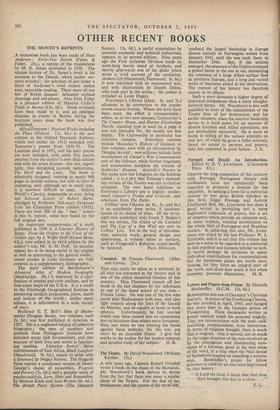OTHER RECENT BOOKS
THE MONTH'S REPRINTS A HANDSOME book has been made of Hans Andersen : Forty-Two Stories (Faber & Faber. 25s.), a reprint of the translations by M. R. James published in 1930. The unique feature of Dr. James's work is his recourse to the Danish, which earlier ver- sions avoided ; his selection of just under a third of Andersen's total output makes easy, enjoyable reading. There seem all too few of Robin Jacques' delicately stylised drawings and tail-pieces. Also from Faber is a pleasant edition of Maurice Collis's Trials in Burma (12s. 6d.). Some revisions have been made to it, and an epilogue sketches in events in Burina during the fourteen years since the book was first published.
Alfred Tennyson : Poetical Works including the Plays (Oxford. 12s. 6d.) is the new volume in the Oxford Standard Authors, which had earlier (in 1912) included only Tennyson's poems from 1830-70. The Laureate died in 1892, and his later poems are now included, with some fifty poems omitted from the author's own final edition and with his seven dramas—but not, regret- tably, that intriguing juvenile melodrama, The Devil and the Lady. The book is admirably designed, running to nearly 900 pages in double column, but with no hint of cramping, and, although set in small type, it is nowhere difficult to read. Oxford World's Classics, impeccable as ever, bring out Selected Letters of Robert Burns, abridged by Professor DeLancey Ferguson from his Clarendon Press edition (1931). There are over 200 of the " best " letters in this 5s. reprint, some now based on the full original text. , • An important reappearance of a work published in 1909 is A Literary History of Rome. From the Origins to the Close of the Golden Age, by J. Wight Duff (Ernest Benn. 42s.), now edited in its third edition by the author's son, Mr. A. M. Duff. Its peculiar appeal lies in its being useful to the scholar as well as interesting to the general reader ; recent studies in Latin literature are fully covered in a supplementary bibliogitphy.
The third edition of Bartholomew's Advanced Atlas of Modern Geography (Meildejohn. 30s.) is improved by a clari- fication of coastal and river outlines, and by four extra maps of the U.S.A. It is a credit to the Edinburgh Geographical Institute in presenting modern projections, plans, charts and indices of the world ; unlike many atlases, it is informative in a wide variety of ways.
Professor E. T. Bell's Men of Mathe- matics (Penguin Books, two volumes, each 2s. 6d.) was first published in America in 1937. His is a neglected subject of collective biography ; the men of numbers and symbols from Pythagoras onwards have included many rich personalities, and this account of their lives and works is fascinat- ing reading. Llewelyn Powys' fierce reminiscences of East Africa, Black Laughter (Macdonald. 8s. 6d.), return to print with a foreword by Negley Farson. The Hogarth Press reprint a condensed version of Henry George's classic of economics, Progress and Poverty (7s. 6d.), and a popular work of psycho-analysis, Love, Hate and Reparation, by Melanie Klein and Joan Riviere (8s. 6d.). The British Party System (The Hansard Society. 12s. 6d.), a useful symposium by nineteen academic and political authorities, appears in its second edition. Nine years ago the First Airborne Division made its week-long heroic stand at Arnhem, and shortly afterwards one of the glider pilots wrote a vivid account ,of the confusion. Arnhem Lift (Hammond, Hammond. 8s. 6d.) is now reprinted with its uncensored text, and with illustrations by 'Joseph Deliss, who took part in the action ; the author is revealed as Louis Hagen.
Everyman's Library (Dent. 6s. and 7s.) advances in its conversion to the ampler crown octavo format. Where the texts have been reset, the effect is commendable ; where, as in two new reissues, Galsworthy's The Country House, and Shorter Elizabethan Novels, standing type is used on a page it was not intended for, the results are less happy. The Galsworthy in particular has excessive margins. Everyman reprints include Macaulay's History of England, in four volumes, now with an introduction by Douglas Jerrold ; new editions include fresh translations of Caesar's War Commentaries and of the Odyssey, while further fragments and annotations complete the volume of Sophocles' Dramas. Aristotle's Poetics in this series now has Longinus on the Sublime added ; it is a pity that Twining's mislead- ing version of the Poetics was not revised or scrapped. The two latest additions to Everyman's Library are a slightly moder- nised Chaucer's Troilus and Criseyde, and selections from The Tatler.
Collins' new. Classics (at 4s., 5s. and 6s.) is an excellently done series, if unadven- turous in its choice of titles. Of the forty- eight now published, only Frank T. Bullen's fine sea stories, The Cruise of the Cachalot and The Log of a Sea Waif are new to Collins' List. Yet in the way of introduc- tion, editorial work, general design and appearance, a volume taken at random, such as Fitzgerald's Rubaiyat, could hardly


















































 Previous page
Previous page